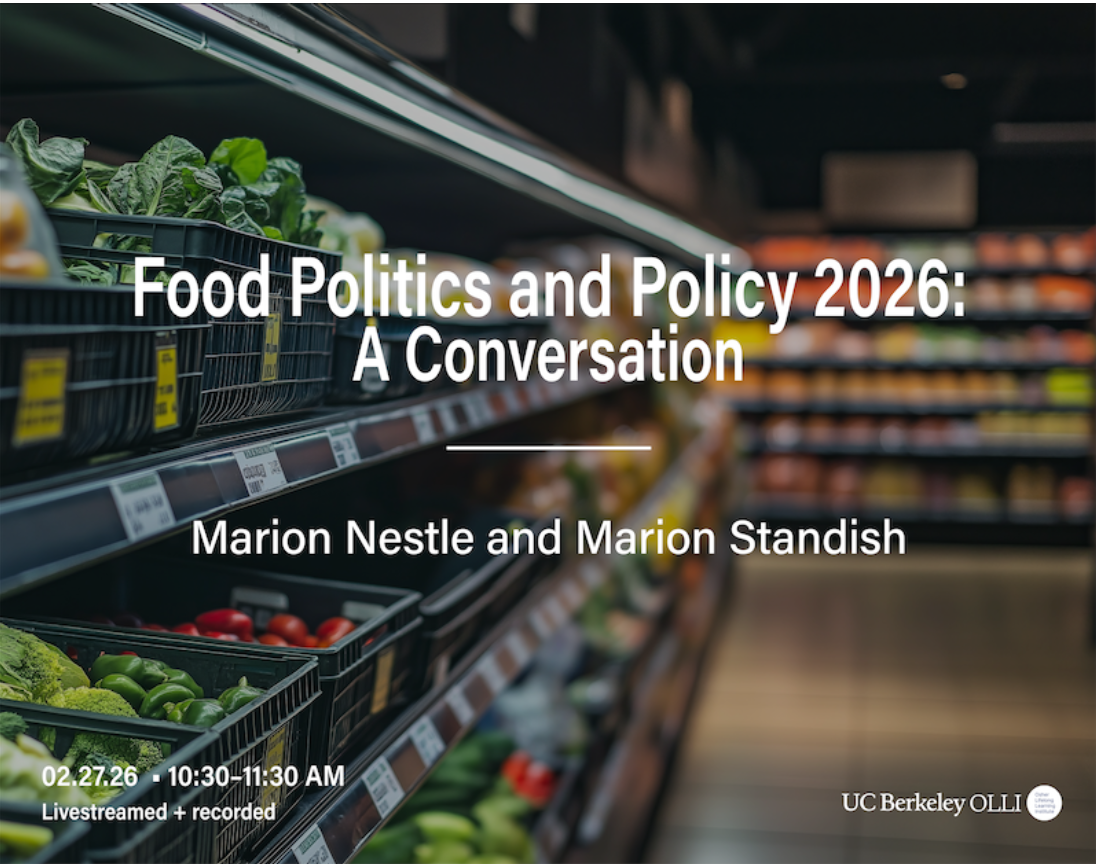Food Politics and Policy 2026: A Conversation with Marion Nestle and Marion Standish.

Beef Checkoffs are USDA-sponsored programs that require producers to pay fees per cattle weight (the checkoff) into a common fund for research and promotion. Here are three examples of the kinds of studies on beef and health that checkoff money pays for. Note that all produce results favoring eating beef (what a coincidence).
Ellen Fried sent me this headline from the New York Post: Eating meat not linked to higher risk of death — and may even protect against cancer-related mortality: study
Eating more meat could be beneficial for the body, a new study suggests [the study is here].
Recent research from Canada’s McMaster University revealed that animal-sourced foods are not linked to a higher risk of death.
The study discovered that animal proteins could also offer protective benefits against cancer-related mortality, according to a press release from the university.
If you scroll down far enough, the Post account, to its credit, ends with:
This research was funded by the National Cattlemen’s Beef Association (NCBA), although the researchers noted that NCBA was “not involved in the study design, data collection and analysis or publication of the findings.”
Effect of unprocessed red meat on obesity and related factors: A systematic review and meta-analysis. Md Akheruzzaman, Marleigh Hefner, Daniel Baller, Shane Clark, Zahra Feizy, Diana M. Thomas, Nikhil V. Dhurandhar. Obesity. 2025. 25 July 2025. https://doi.org/10.1002/oby.24322
Results: We found no significant effect of URM [unprcessed red meat] for BMI, body weight, or percent body fat based on unfiltered pooled effect sizes. Filtered pooled effect size analysis showed a slight adverse effect of URM for total cholesterol and low-density lipoprotein cholesterol.
Conclusions: Studies did not show an effect of URM on weight gain, obesity, or related metabolic conditions.
Funding: This study received funding from the National Cattlemen’s Beef Association (NCBA) Beef Checkoff.
Conflict of interest: [The lead author] received grant support from the Beef Checkoff for conducting the systematic review and meta-analysis. The sponsor did not have any role regarding the study design, data extraction, analysis, or reporting.
“Shaking the ladder” reveals how analytic choices can influence associations in nutrition epidemiology: beef intake and coronary heart disease as a case study Vorland, C. J., O’Connor, L. E., Henschel, B., Huo, C., Shikany, J. M., Serrano, C. A., … Brown, A. WCritical Reviews in Food Science and Nutrition, 2025:1–16. https://doi.org/10.1080/10408398.2025.2525459
We explored the impact of analytical decisions on conclusions in nutrition epidemiology using self-reported beef intake and incident coronary heart disease as a case study….The finding of few statistically significant models does not prove, but may suggest, minimal association between beef and CHD. A qualitative inspection of our figures suggested that two variables had the greatest influence on results: years of multivitamin use and race…Not adjusting for these particular covariates, which indirectly capture concepts related to health consciousness and SES, may produce more extreme results because of confounding.
Funding: Funded by the Beef Checkoff….
Disclosure statement: In the 36 months prior to the initial submission, Dr. Vorland has received honoraria from The Obesity Society and The Alliance for Potato Research and Education. In the 36 months prior to the initial submission, Dr. Allison has received personal payments or promises for same from: Amin Talati Wasserman for KSF Acquisition Corp (Glanbia); Clark Hill PLC; General Mills; Kaleido Biosciences; Law Offices of Ronald Marron; Medpace/Gelesis; Novo Nordisk Fonden; Sports Research Corp.; USDA; and Zero Longevity Science (as stock options). Donations to a foundation have been made on his behalf by the Northarvest Bean Growers Association. The institution of Dr. Vorland, Ms. Henschel, Mr. Serrano, Ms. Dickinson, and Dr. Allison, Indiana University, and the Indiana University Foundation have received funds or donations to support their research or educational activities from: Alfred P. Sloan Foundation; Alliance for Potato Research and Education; American Egg Board; Arnold Ventures; Eli Lilly and Company; Mars, Inc.; National Cattlemen’s Beef Association; Pfizer, Inc.; National Pork Board; USDA; Soleno Therapeutics; WW (formerly Weight Watchers); and numerous other for-profit and nonprofit organizations to support the work of the School of Public Health and the university more broadly. Dr. O’Connor’s research is funded by internal funds at the Agricultural Research Service, USDA and the National Cancer Institute, NIH as well as external funds from the National Institute of Agricultural, USDA and the Beef Checkoff. Dr. O’Connor also served unpaid on the National Pork Board – Real Pork Research Advisory 2nd Advisory Council. In the past 36 months, Dr. Brown has received travel expenses from Alliance for Potato Research and Education, International Food Information Council, and Soy Nutrition Institute Global; speaking honoraria from Alliance for Potato Research and Education, Calorie Control Council, Eastern North American Region of the International Biometric Society, International Food Information Council Foundation, Potatoes USA, Purchaser Business Group on Health, The Obesity Society, and University of Arkansas for Medical Sciences; consulting payments from National Cattlemen’s Beef Association, and Soy Nutrition Institute Global; and grants through his institution from Alliance for Potato Research & Education, American Egg Board, National Cattlemen’s Beef Association, NIH/NHLBI, NIH/NIDDK, NIH/NIGMS, and NSF/NIH. He has been involved in research for which his institution or colleagues have received grants or contracts from ACRI, Alliance for Potato Research & Education, Gordon and Betty Moore Foundation, Hass Avocado Board, Indiana CTSI, NIH/NCATS, NIH/NCI, NIH/NIA, NIH/NIGMS, NIH/NLM, and UAMS. His wife is employed by Reckitt. Other authors report no disclosures in the last 36 months prior to the initial submission.